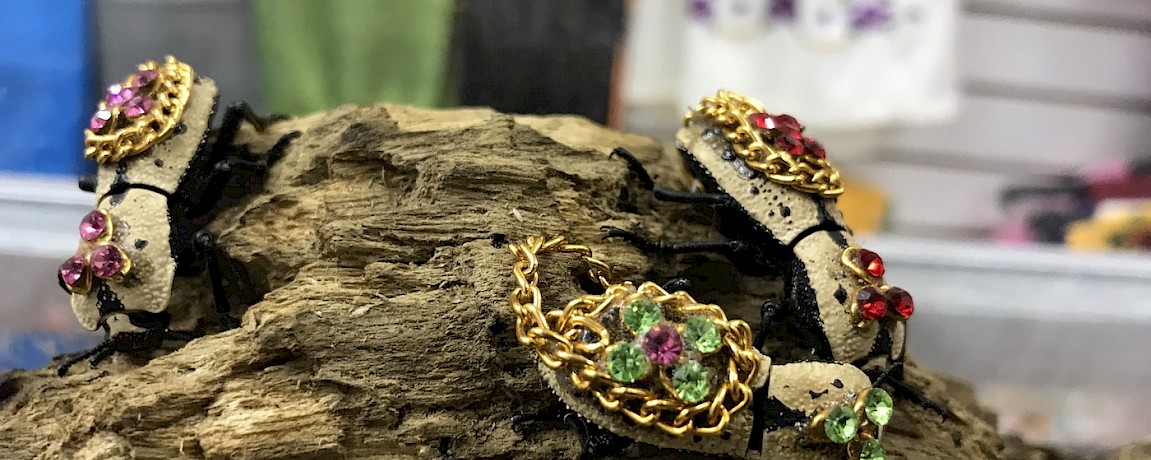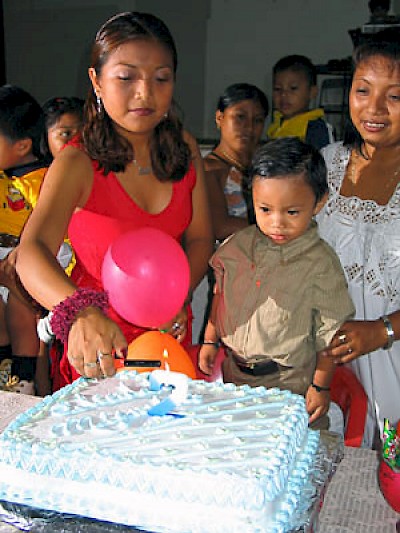What's in a (Spanish) Name?
If you aren't an aficionado of all things Mexican (which we weren't when we first moved to Yucatan), during your first few months of living here, you will meet people with names that are unfamiliar. Some of them are cute, some are funny and some are just downright odd.
Let's start with Spanish names. In our pre-Working Gringo days in California, we were familier with names like Jose, Jorge or Maria because California roots are, after all, Mexican. We suspect that perhaps many of the Mexicans we came in contact with may have adopted these more normal Spanish names to make life easier for themselves.
Upon immersing ourselves in Yucatan, we were confronted with names like Socorro, Izauro, Santiago and Ignacio... names that were definitely new to us. Some of these names (like the ones just mentioned), we found rather beautiful. Working Gringa's Spanish name is Elena, yet another beautiful name. But Working Gringo's name translated into Spanish has not been quite so painless. While "James" is a perfectly fine name in English, the Spanish version of James (pronounced "Hah-mess") is rather uncommon and not quite so pleasing. What's more, the alternative of Jaime always raises a chuckle from our Spanish-speaking friends - we're not sure why. Apparently, Santiago also means "James" and Working Gringo has found that much more amenable.
Of course, if you don't like your name, there is always the option of a nickname. Nicknames are popular here, but connections to their antecedents have not always been obvious to us. Here are some Mexican nicknames that we have run across and the "given" names that they are related to:
- Jesús (a common name here) becomes Chucho
- José becomes Pepe
- Ignacio becomes Nacho
- Socorro becomes Soco or Coco
- Maria Elena becomes Malena
- Eugenia becomes Genny (pronounced "Henny")
- Beatriz becomes Betty
- Concepcion becomes Conchi
- and so on...
Then there are the stranger dimunitives. There is a popular hardware store in the Yucatan named Boxito. From our Mayan language studies, we have learned that box means "black" and the Spanish suffix -ito means "little". As it turns out, we were right! Boxito is a nickname given to a little guy who has dark skin. It is a dimunitive name, given out of affection or familiarity, not out of disrespect. And it was probably the nickname of the man who started this very successful chain of stores. Other dimunitives in that vein are Flaco (skinny man), Gorda (fat female), Gordita (little fat female), Guera (white woman), Guapo (handsome man), Rubia (blonde woman). And of course, just change the "a" to "o" or vice-versa, and the name gets a sex change. Fun and easy!
While we're on the subject, the habit of adding dimunitives to names is a charming one and we're not sure how we lived without it before now. Mama becomes mamacita, abuelo becomes abuelito, gata becomes gatita and the list goes on ad infinitum. If you work at it hard enough, you can add -ito or -ita to almost anything and that thing is suddenly little, cute and endowed with charm and endearment. Of course, this is also used for names: Lupe becomes Lupita (at least one cafe in every town in Mexico is Cafe Lupita), Estrella becomes Estrellita, Angel becomes Angelito, etc.
But our favorites are the names we would never have thought of in a million lifetimes. Our assistant, the Amazing Beatriz, has told us about people she has met (more than one!) named Annirev. We pondered over that for a few minutes when we heard it but she finally had to tell us that it is the abbreviation for Anniversaire de Revolución (The Anniversary of the Revolution), which is the way the holiday on November 20 is often presented on a calendar.
We ourselves have met more than one young woman named Leydi Diana. All the Leydi's we have met seem to be in their early twenties... hmmm! Certainly not a coincidence.
The Amazing Beatriz also told us about a story she read in the local paper a few years back. There was a local whose name was Onecent (pronounced "OHN-neh-sent"). We puzzled over this one too but she told us not to bother. The story was that the father of Onecent had been out in the milpa (corn field) one day, and he had found a coin on the ground. On it, the coin had the letters ONE CENT and when his son was born later that day, he was so named. He could have been named Ingodwetrust ("een-gohd-WAY-troost") but that probably didn't trip off the tongue quite so lightly.
When we were researching this article, we found a story from last summer about the Mexican government cracking down on "strange" baby names, trying to save their little citizens (paisanitos?) from future embarassment in the schoolyard. Apparently, inventive names are a Mexican tradition and a custom that we think is rather endearing. Adorable. Charming. It's a customita! (Okay, so it doesn't work all the time...)
Have you heard any interesting names here in the Yucatan? Please tell us... we're fascinated!









Comments
NT 18 years ago
Ok.. if I have heard some interesting name in yucatan?? mmmmm... yea everyday my middle name is a little interesting, but I'm proud of it.
My middle name is "TONATZIN" which means "son of the war" in Nahuatl.
Reply
Jackity 18 years ago
The Mexican (from Aventuras Akumal--a fabulous waterfront tourist destination) who meets & greets guests of our oceanfront rentals was given the nickname "Pillo", because when he was a child his hair looked like a brush (cepillo). Over the years the gringos he's worked with adopted the spelling "Pio" (pronounced pee'-yoh). (We heard a Texan the other day roll his "lls" when he ordered pollo!"
Reply
Stephanie 18 years ago
My Mexican boyfriend informed me that "Pepe" stands for "P.P." or "padre putativo," and that it's the nickname for Jose because it refers to Joseph, the "putative" father of Jesus. I always thought that was fascinating! Thanks for your post--"Chucho" stumped me for a long time.
Reply
tang kristyn 18 years ago
hello..its really interesting to come to know about spanish names..nicks n all..ehhhehh..and i would like to know hows my name like in spanish.thank you.tang kristyn.
Reply
Working Gringos 18 years ago
We think so too!!
Reply
James (Santiago) 18 years ago
In northern Mexico they call me Chago. In Colombia they call me Santi. In my English class they call me Santi Chago and think it's very funny.
Reply
Working Gringos 18 years ago
We went looking for a Saints Day Calendar as you describe, and it is not a simple matter. We point you, therefore, to the Wikipedia offering and let you take it from there:
http://en.wikipedia.org/wiki/Calendar_of_saints
Reply
silvia orozco 18 years ago
I was wondering if you know where I can see the calender with the names of the saints that correspond to each day. ( eg. Santos would be a male name born on Dia de Todo Los Santos)
Reply
Working Gringos 18 years ago
Hola Kathy,
"X" is always pronounced like an English "sh" (or "ish") in Mayan. But we're lucky Mayan is consistent that way.
When the Spanish arrived in the New World, they converted the Native American words they heard into their written alphabet and put an "X" for any sound they didn't understand. (At the time, there was no letter "X" in the Spanish alphabet, we're told. It was simply used as a placeholder.)
This has lead to some confusion, for example, the alternate spelling for Xalapa (which isn't a Mayan word) is Jalapa, just to clear things up. Some Nahuatl words with "X" are pronounced "sh" but others like "ch" or just "h". Some argue that the word Mexico should be pronounced MEH-shee-koh.
Reply
kathy 18 years ago
A question of a different color. Do you have any idea why the "X" in Xalapa or the "X" in Xilitla is not pronounced "sh"? I keep calling poor little Xilitla Sheeleetla because it sounds right. I think everyone else in SLP calls it "HEEleetla". Is the "sh" for "x" an Argentinian thing or a Mayan thing? (I learned Spanish on the streets of Argentina)
Reply
Grant 18 years ago
My favorite Merida name is Floricel (man's name). Floricel couldn't account for it except to say his parents liked the sound, so that's all that was required.
Nobody can pronunce my name, of course. They make it through the "Gran" part ok, but something about two consontants together in the same syllable makes the final "t" impossible. I stopped quibbling about it early on.
Also strange is what happens to your name as shown in your US passport. As noted by other commentators, the normal hispanic name format is First Name, Father's Surname, Mother's Surname. A US passport has First Name, Middle Name, Last Name. So people at the bank, say, will look at your passport and address you as Mr. (Middle Name). The first couple of time this happens, it seems very odd.
Reply
« Back (70 to 81 comments)Next »